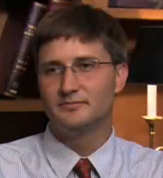
Oskar Liivak
Associate Professor of Law
Cornell University Law School
Oskar Liivak, Associate Professor of Law, graduated from Rutgers College with highest honors in 1994, received a Ph.D. 2000 in physics from Cornell University focusing on techniques for determining protein structure, and received a J.D. from the Yale Law School in 2005. From 2000 to 2001, he was a post-doctoral scientist working on physical realization of quantum computing in the Quantum Information Group at IBM's Almaden Research Center in San Jose, California. Prior to law school, he served as a patent agent in the Boston office of Fish and Richardson P.C. Most recently, Professor Liivak served as a law clerk to Judge Sharon Prost on the United States Court of Appeals for the Federal Circuit.
Liivak: Interview
Liivak speaks with Valerie Hans on several issues:
Question 1: The Legal Framework for Social Science Evidence in Trademark Cases
Question 2: Advantages of Survey Evidence
Question 3: Confirming survey evidence findings with other witnesses
Question 4: Choosing a Sample for Trademark Litigation
Question 5: Choosing a Survey Approach in Trademark Litigation (Domino's Pizza case example)
Question 6: Lawyer-social scientist interaction
Question 7: Do lawyers and scientists think differently about consumer confusion?
Question 8: Do you see limitations in the way social science evidence is used in trademark cases?
Question 9: Do you see problems with expert testimony in intellectual property cases?
Question 10: Are there serious problems with junk science in trademark cases?
Question 11: Hans and Liivak discuss survey research companies in trademark cases
Question 12: Peer review versus cross-examination as assessment tools for social science evidence
Question 13: Do you see judge and jury comprehension problems in trademark cases?
Question 14: Discussion of Two Pesos v. Taco Cabana
Question 15: Are there differences in the ways that lawyers and scientists think?
Question 16: How do lawyers and scientists think about uncertainty?
Question 17: In what ways do lawyers and scientists misunderstand one another?
Question 18: What's the future of social science in trademark cases?
Question 19: Testing assumptions underlying patent law
Question 20: Should we remove juries from patent cases?
